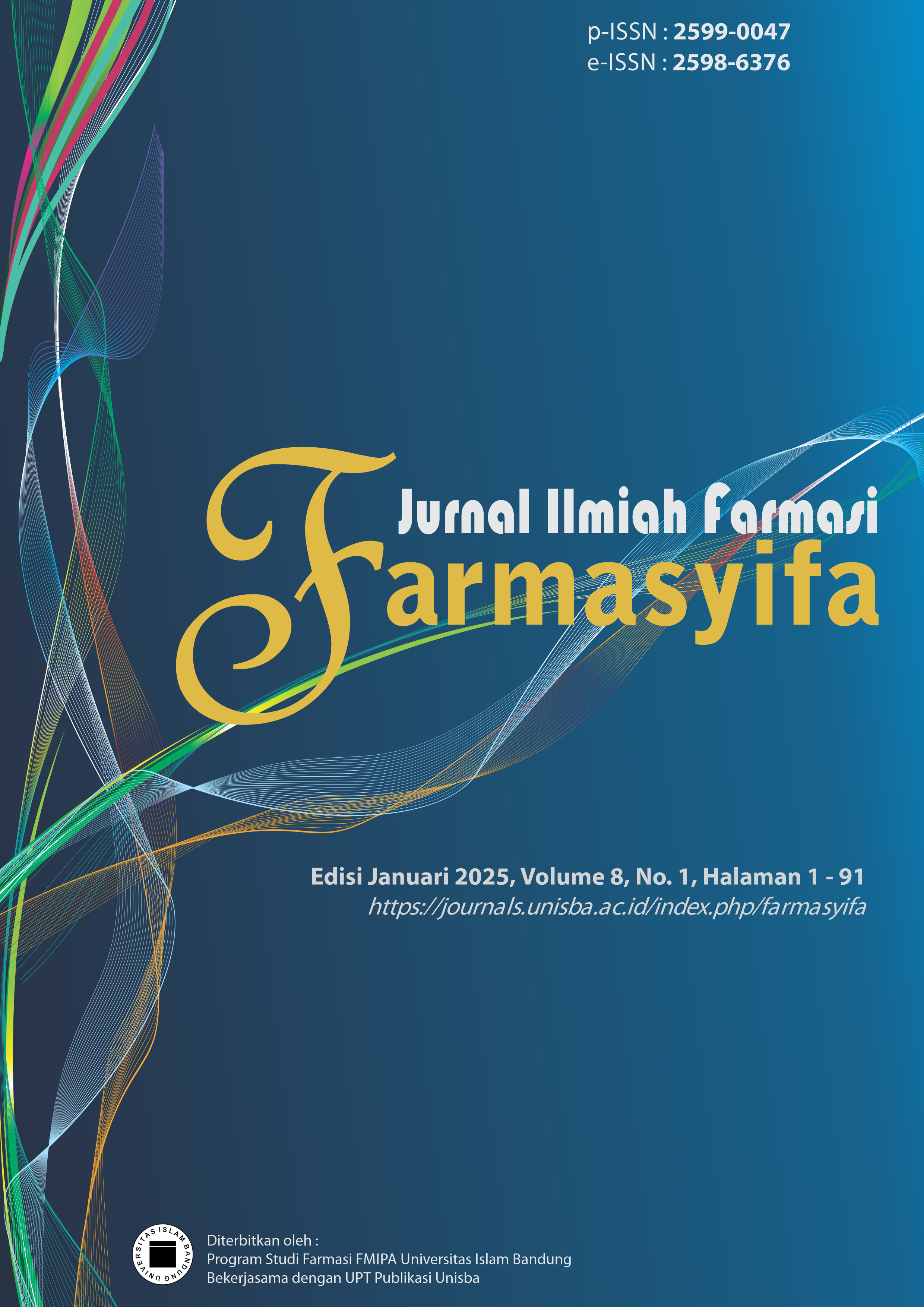Utilization of Coconut Shell Activated Carbon as an Adsorbent in Reducing Copper (Cu) Levels in Sebamban River Water
PEMANFAATAN KARBON AKTIF TEMPURUNG KELAPA SEBAGAI ADSORBEN DALAM MENURUNKAN KADAR TEMBAGA (Cu) PADA AIR SUNGAI SEBAMBAN
DOI:
https://doi.org/10.29313/jiff.v8i1.4434Keywords:
Activated Carbon, Copper (Cu), Coconut ShellAbstract
Sebamban River is one of the rivers located in Tanah Bumbu Regency, South Kalimantan Province which is commonly used by the people in their daily activities. However, this river has a copper (Cu) contamination that exceeds the established threshold. This study aims to utilize the adsorption of coconut shell activated carbon to reduce copper (Cu) levels in the Sebamban River. This study was conducted using a quantitative method in a true-experimental manner, treatment of test samples with a post-test only control group design, analyzed using a one-way Anova test with an Atomic Absorption Spectrophotometry (AAS) instrument. The results showed that the copper (Cu) levels in the Sebamban River water were 25.06 mg/L. After being soaked using coconut shell activated carbon with a time variation of 30 minutes, the content was 14.45 mg/L or a decrease of 41.97%, 60 minutes the content was 7.15 mg/L or a decrease of 71.46% and 60 minutes the content was 1.52 mg/L or a decrease of 93.93%. Based on the results of the study, there is an effect of time on the administration of coconut shell activated carbon.
References
Alimah, D., Istikowati, W. T., & Nugroho, Y. (2023) Kualitas Arang Kayu Akasia Daun Kecil (Acacia auriculiformis) Quality of Charcoal Made from Small Leaf of Acacia Wood (Acacia auriculiformis). In Jurnal Hutan Tropis (Vol. 11, Issue 2)
Andiani, B. Y., Riyanto, C. A., & Martono, Y. (2022). Characterization of Cassava (Manihot esculenta Crantz) Peel Activated Carbon based on Impregnation Ratio and Activation Temperature. Stannum : Jurnal Sains Dan Terapan Kimia, 4(1), 19–26. https://doi.org/10.33019/jstk.v4i1.2533
Ariq, M. R., Afriani, K., Zuliandanu, D., & Suhartini, S. (2022). Verifikasi Metode Uji Penetapan Kadar Tembaga (Cu) dalam Air Permukaan secara Spektrofotometri Serapan Atom. Warta Akab, 46(1).
Dewi, L., Hadisoebroto, G., & Anwar, K. (2021). Penentuan Kadar Logam Timbal (Pb) Dan Tembaga (Cu) Pada Sumber Air Di Kawasan Gunung Salak Kabupaten Sukabumi Dengan Metode Spektrofotometri Serapan Atom (SSA). Jurnal Sabdariffarma Tahun, 9(2), 15–24.
Harmawanda, S., Wahyuni, D., Nurhanisa, M., Zulfian Program Studi Fisika, dan, Matematika dan Ilmu Pengetahuan Alam, F., Tanjungpura, U., & Hadari Nawawi, J. H. (2023). Efektivitas Karbon Aktif dari Limbah Tongkol Jagung dengan Variasi Aktivator Asam Klorida dalam Penyerapan Logam Besi pada Air Gambut. https://journal.unnes.ac.id/nju/index.php/jf/index
Indah, D. R., & Safnowandi, S. (2020). Karakterisasi Karbon Baggase Teraktivasi dan Aplikasinya untuk Adsorpsi Logam Tembaga. Hydrogen: Jurnal Kependidikan Kimia, 7(2), 46-54. http://ojs.ikipmataram.ac.id/index.php/hydrogen/index
Kristiyana, K., Prasetya, A. T., & Kasmui, K. (2020). Perbandingan Metode Destruksi Sedimen Sungai Kaligarang pada Analisis Logam Cu Menggunakan Flame Atomic Absorption Spectrometer (FAAS). Indonesian Journal Of Chemical Science, 9(2), 99-105.
Malik, M. R., Sugrani, A., Fitriana, F., & Taufiq, N. (2023). Analisis Logam Berat pada Air Waduk Tunggu Pampang. Jurnal Sehat Mandiri, 18(1), 105-112.
Mudaim, S., & Hidayat, S. (2021). Analisis Proksimat Karbon Kulit Kemiri (Aleurites Moluccana) Dengan Variasi Suhu Karbonisasi. In Jurnal Ilmu dan Inovasi Fisika) (Vol. 05, Issue 02)
Nugraha, F., Kurniawan, H., & Yastiara, I. (2023). Penetapan Kadar Paracetamol dalam Jamu di Kota Pontianak Menggunakan Instrumen Spektrofotometri UV-Vis. Indonesian Journal of Pharmaceutical Education, 3(1). https://doi.org/10.37311/ijpe.v3i1.18876
Oko, S., Mustafa, M., Kurniawan, A., & Palulun, E. S. B. (2021). Pengaruh suhu dan konsentrasi aktivator HCl terhadap karakteristik karbon aktif dari ampas kopi. METANA, 17(1), 15-21. https://doi.org/10.14710/metana.v17i1.37702
Oktaviandra, R., Dwi Nurlaeli, P., & Billah, tasim. (2020). Pemanfaatan Tempurung Kluwak Sebagai Adsorben Dalam Menurunkan Kadar Logam Berat Tembaga. In Journal of Chemical and Process Engineering ChemPro Journal (Vol. 01, Issue 01). www.chempro.upnjatim.ac.id
Rizky, S., & Silalahi, R. (2022). Pengaruh Waktu Kontak Terhadap Efisiensi Adsorpsi Ion Logam Cu(II) Pada Karbon Aktif Bunga Pinus Merkusii. In Jurnal Inovasi Ramah Lingkungan (JIRL) (Vol. 3, Issue 3).
Ruhmawati, T., Budiasyah, T., & Setiawan, R. (2020). Efisiensi Penyisihan Kadar Amoniak Limbah Cair Rumah Sakit dengan Proses Adsorpsi Karbon Aktif Bijih Plastik. Jurnal Kesehatan Lingkungan Indonesia, 19(2), 82–88. https://doi.org/10.14710/jkli.19.2.82-88
Samosir, A. F., Yulianto, B., & Suryono, C. A. (2019). Arang Aktif dari Ampas Kopi sebagai Absorben Logam Cu Terlarut dalam Skala Laboratorium. In Journal of Marine Research (Vol. 8, Issue 3).
Saputri, R & Hakim, A.R. (2021). Metodologi Penelitian Kesehatan. CV. Pena Persada.
Susmanto, P., Yandriani, Y., Dila, A. P., & Pratiwi, D. R. (2020). Pengolahan Zat Warna Direk Limbah Cair Industri Jumputan Menggunakan Karbon Aktif Limbah Tempurung Kelapa pada Kolom Adsorpsi. JRST (Jurnal Riset Sains Dan Teknologi), 4(2), 77. https://doi.org/10.30595/jrst.v4i2.7309
Downloads
Published
How to Cite
Issue
Section
License
Copyright (c) 2025 Mulia Rahmah, Tuti Alawiyah, Rohama, Rahmadani

This work is licensed under a Creative Commons Attribution-ShareAlike 4.0 International License.






















